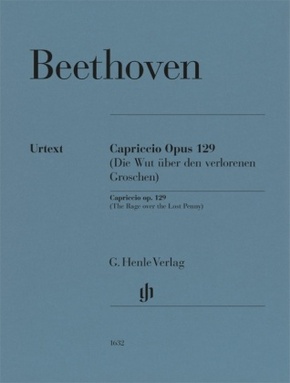Ludwig van Beethoven - Alla Ingharese quasi un Capriccio G-dur op. 129 (Die Wut über den verlorenen Groschen) - Besetzung: Klavier zu zwei Händen
| Verlag | Henle |
| Auflage | 2023 |
| Seiten | 19 |
| Format | 23,5 x 0,4 x 31,0 cm |
| Gewicht | 110 g |
| Reihe | G. Henle Urtext-Ausgabe |
| ISBN-13 | 9790201816326 |
| Bestell-Nr | 96322435BA |
Das 1794/95 komponierte Rondo für Klavier ist vor allem unter seinem Beinamen "Die Wut über den verlorenen Groschen" bekannt geworden, der allerdings nicht vom Komponisten stammt, sondern nachträglich von fremder Hand ins Autograph notiert wurde. Beethoven selbst betont in seinem Originaltitel den Stil "all'ungharese", den er als "Ingharese" verballhornt und damit überdeutlich den humoristischen Grundzug dieses temperamentvollen Stücks herausstellt. Robert Schumann meinte treffend: "Etwas Lustigeres gibt es schwerlich, als diese Schnurre. Hab' ich doch in einem Zug lachen müssen, als ich's neulich zum erstenmale spielte".
Für die Revision der Urtextausgabe auf neuestem Forschungsstand zeichnet Beethoven-Spezialistin Joanna Cobb Biermann verantwortlich, der chinesische Pianist Haochen Zhang verrät seinen Fingersatz für dieses beliebte Werk.
Inhaltsverzeichnis:
Alla Ingharese quasi un Capriccio (Die Wut über den verlorenen Groschen) G-dur op. 129
This rondo for piano was composed in 1794/95 and has become known primarily by its sobriquet "The rage over the lost penny". However, this did not originate with the composer himself, but rather added to the autograph later by another hand. In his own original title, Beethoven emphasised its "Hungarian" style, though he wrote "Ingharese" instead of "all'ungharese", thereby emphasising the humorous nature of this spirited piece. Robert Schumann aptly remarked that "There can hardly be anything more amusing than this little tale. I had to laugh from the beginning to the end when I played it for the first time recently".
Beethoven specialist Joanna Cobb Biermann was responsible for revising the Urtext edition of this popular work in line with the latest research, while Chinese pianist Haochen Zhang provided his own fingerings for it.
Inhaltsverzeichnis:
Alla Ingharese quasi un Capriccio (The Rage over the Lost Penny) G major op. 129

